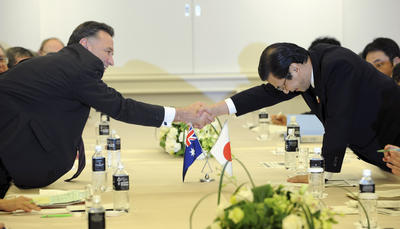Sound like a tall order?
Maybe, but Japan’s future economic prosperity depends on it. And there are just a few things that Kan needs to get right to secure it. Japan and Australia created APEC just for this kind of job — as an instrument for mobilising regional support behind national reform strategies from which the whole region benefits as well — and now is the time for Japanese leadership to use it.
Japan has been the dynamo behind much of the change that has transformed the Asian and Pacific economy. The development of highly efficient regional investment and production networks in Asia was led by Japanese corporations as they sought to build their global competitiveness by going offshore. Over 35 per cent of the output of core Japanese manufacturing firms is now produced outside Japan, much of it in other Asian economies. Japanese manufacturing is outward-looking, efficient and competitive, among the most competitive manufacturing sectors in the world.
But while the Japanese manufacturing sector has done the heavy-lifting for the Japanese economy, agriculture and much of the service sector has been cosseted behind inward-looking trade barriers and domestic regulation. Inward investment, critical to economic revitalisation, has also been kept at bay. Japan is an outlier with FDI at only 3 per cent of GDP compared to a world average of 30 per cent and 45 per cent in Southeast Asia.
There is wide understanding that this has all got to change if Japan’s economy is not to be weighed under by the burden of mounting debt and an ageing demographic. Protecting agriculture can no longer be the excuse for holding back the Japanese economy from regional and global economic engagement and initiative. Unshackling the service sector and profound reform of labour and other factor markets, including by creating the social and institutional conditions for using the labour and creativity of its women, is a priority. Situated as it is at the heart of the most dynamic element in the global economy, Japan has no excuse for its own economic malaise but its failure to embrace these reforms.
APEC has an agenda that encompasses commitment to progress on all these fronts. In this tenth year after signing on to the Bogor goals of trade and investment liberalisation, the advanced economies in APEC, like Japan, have to go the final step with a credible program for getting rid of the main residual barriers to trade, in Japan’s case on agriculture. And there has to be long term commitment to an agenda of structural and regulatory reform that will lift Japan to the economic frontier where it has the potential to be.
The Japanese government has been trying to muster the courage to join the Trans-Pacific Partnership (TPP) group of economies to prosecute these reforms. To outside observers that seems more like a way of putting off decision-time and not using the occasion to commit to change now. TPP is not going to deliver the comprehensive change that Japan needs now any time soon.
So come the APEC Summit on Saturday Prime Minister Kan needs to make just three things clear.
- While Japan and its partners in APEC have made good progress on the Bogor goals of trade and investment liberalisation, Japan is committed to taking the final step: not waiting just for TPP to deliver something, but setting out a strategy for taking agricultural trade reform forward multilaterally, as it will have to be;
- APEC has a global responsibility, which Japan shares fully, not only for liberalisation of trade and investment which the next phase of implementing APEC’s goals will help deliver, but also for developing a structural reform agenda, with defined milestones, that helps re-balance the global economy and deepens international through the creation of a single, seamless regional economy;
- Japan, together with its APEC partners, commits to prompt conclusion of the Doha Round and, going forward globally, undertakes that regional initiatives, like TPP or FTAAP (the Free Trade Area of the Asia Pacific idea) will be pursued only if that are genuinely consistent with WTO multilateral objectives: at this point the fragile state of international economic diplomacy demands nothing less.
Peter Drysdale is Emeritus Professor of the Crawford School at the Australian National University and, with Okita Saburo and others, was one of the founding fathers of APEC.

